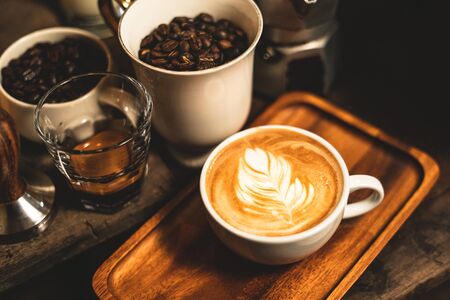Setting the Scene: British Cafés and Coffeehouses
Step into any British café or coffeehouse, and you’ll find yourself in a world where character and quirkiness are brewed stronger than the espresso. The UK’s coffee culture is a unique blend of old-world tradition and modern-day banter—part sanctuary, part social experiment. Here, the air hums with the gentle clink of cups, the hiss of steam, and that ever-present undercurrent of British humour; sarcasm is served as liberally as sugar. Cafés range from independent nooks with mismatched chairs to high-street chains pulsing with life, but all offer a stage for local characters—the gossiping pensioners, students hunched over laptops, harried mums, and the barista who knows everyone’s order (and isn’t shy with a wry comment). Despite coffee’s reign, tea still sneaks onto every menu—a nod to tradition that refuses to budge. Whether it’s builders’ brew in a mug or an artisanal loose-leaf blend, you’ll find tea quietly holding its ground alongside flat whites and americanos. In these spaces, conversation flows as freely as the caffeine: a mix of self-deprecating jokes, razor-sharp wit, and that classic British ability to laugh at oneself—especially when discussing the weather or queuing etiquette. This is more than just caffeine; it’s community, comedy, and comfort all stirred together—bloody good brews indeed.
2. A Brew with a View: The Evolution of British Coffee
Once upon a foggy morning, in the land of the stiff upper lip and the eternally damp umbrella, coffee tiptoed onto the British scene. While Britain is famously besotted with tea—cue the collective gasp at the mention of anything but Earl Grey or builder’s brew—coffee has brewed its own rebellious little revolution. And no, it didn’t just appear alongside avocado toast and ironic moustaches. In fact, coffee first arrived in England in the 17th century, when coffee houses popped up faster than you could say “one lump or two?” These establishments quickly became hotspots for wit, wisdom, and more than a smidge of sarcasm—a sort of Wi-Fi-free Twitter for the powdered wig set.
Of course, every good British tale comes with a side of banter and a healthy dose of rivalry. Tea drinkers have long poked fun at their coffee-loving compatriots, casting suspicious eyes on anyone daring to stray from a ‘proper’ cuppa. “Isn’t that just burnt water?” they’d mutter into their floral mugs. But as espresso machines marched in and flat whites conquered high streets from Brighton to Birmingham, British humour found new material: whether you prefer your brew to taste like molten tar or something resembling warm dishwater, there’s always room for a bit of friendly mockery.
The Great British Brew-Off: Coffee vs Tea
| Coffee | Tea | |
|---|---|---|
| Stereotypical Drinkers | Sleep-deprived creatives, urbanites, sarcastic baristas | Grannies, cricket fans, anyone who says “pop round for a chat” |
| Common Jokes | “Rocket fuel for Mondays” | “Liquid comfort in a mug” |
| Best Served With | Biscuit (for dunking), slice of cake (for balance) | Scone (with jam first, obviously) |
| Sarcastic Remarks | “Ooh, look at you with your posh beans!” | “Real Brits don’t need caffeine this strong.” |
From Penny Universities to High-Street Chains
In days gone by, coffee houses were dubbed “penny universities”—for the price of one cup, you could sit among intellectuals and eavesdrop on debates about politics or poetry (or simply the neighbour’s questionable hat). Fast forward to today and you’ll find Brits queuing patiently for their lattes at chains where everyone pretends not to care how their name is spelled on the cup. Yet through centuries of change—and endless streams of witty complaints—coffee has earned its place alongside tea as a staple of British banter and daily life.
![]()
3. Sarcasm with Your Flat White: The Spoken Banter
Step into any British coffee shop and you’ll soon discover that the banter swirling around the espresso machine is as rich and complex as the brews themselves. Here, sarcasm isn’t just a conversational tool—it’s an art form, refined over centuries of tea and, more recently, coffee consumption. It’s common to hear a barista quip, “Would you like some actual coffee with your milk?” or a customer reply, “Oh, just make it strong enough to wake me up until next Tuesday.” This dry, understated humour forms the backbone of British social interaction, especially in those precious moments waiting for a flat white or cortado. What might sound like a complaint about the weather (“Another sunny day in paradise!”) or a gentle jab at the price of a cappuccino (“At these prices, I hope it comes with a free biscuit!”) actually serves as social glue, breaking down barriers and inviting camaraderie among caffeine-seekers.
4. Brew-ha-ha: British Sense of Humour in Coffee Culture
Walk into any independent coffee shop across the UK, and you’re likely to be greeted by more than just the rich aroma of freshly ground beans. The British love for humour, particularly of the irreverent and sarcastic variety, is steeped as deeply in coffee culture as the espresso itself. From witty blackboards to cheeky tip jars, these moments of banter are as common as a full English on a Sunday morning.
If you’ve ever chuckled at a sign reading “No decaf served after 3pm – we care about your street cred,” or pondered whether to leave your spare change in the tip jar labelled “Unicorn Food Fund,” you’ve witnessed this comedic tradition firsthand. It’s not just about getting your caffeine fix – it’s about feeling like you’re part of a running joke that everyone’s in on.
Common Humorous Touches in British Coffee Shops
| Feature | Example | Banter Level |
|---|---|---|
| Blackboard Specials | “Espresso yourself before you wreck yourself” | Cheeky |
| Tip Jar Labels | “Help us buy better jokes” vs “Save the unicorns” | Sarcastic & Whimsical |
| Menu Puns | “The Flat White Album” (for Beatles fans) | Clever & Playful |
| Staff Banter | Barista: “Having a latte trouble deciding?” | Friendly Sarcasm |
| Mismatched Mugs | Mug says: “This might be gin” for your Americano | Tongue-in-Cheek |
The Social Glue of Sarcasm
This dry wit serves as a social lubricant in British coffee shops, breaking the ice between strangers and regulars alike. In a culture where directness can sometimes feel impolite, humour smooths over awkwardness with a wink and a nudge. More than just decoration, these irreverent jokes foster an atmosphere where even a Monday morning feels less dreadful.
A Little Laughter With Your Latte?
Ultimately, the British coffee experience isn’t just about what’s in your cup – it’s also about sharing a laugh while you sip. Whether it’s a groan-worthy pun or some classic self-deprecating sarcasm, these little moments make each visit memorable. Next time you’re queuing for your flat white, keep an eye out – you might just find the best joke of your day scribbled on the specials board.
5. The Not-So-Secret Menu: Unwritten Rules and Social Rituals
If you think ordering a coffee in Britain is as simple as “one flat white, please,” you’re sorely mistaken, mate. An engineering take on the social engineering of UK coffee orders reveals an intricate matrix of etiquette, banter, and the ever-present threat of social faux pas. Like deciphering a circuit diagram, cracking the code behind British coffee culture requires both precision and a keen eye for subtle signals.
The Unspoken Blueprint
Much like a well-drafted engineering spec, there’s an unwritten protocol to follow when queueing (never “lining up” here) and placing your order. Queue-jumping is cardinal sin number one, so respect the invisible boundaries—no matter how desperate you are for that caffeine hit. When it’s finally your turn, keep it brief and avoid the dreaded indecisive dithering; no one likes a bottleneck at the order counter.
Order Customisation: Know Your Limits
British humour thrives on self-deprecation and understatement. Order your oat milk triple-shot caramel macchiato with extra foam too loudly and you might find yourself the subject of knowing glances or gentle ribbing. Modesty is key: “Just a regular coffee, please,” is often code for “I’d like something fancy but don’t want to sound pretentious.” It’s all about reading the room—and the barista’s eyebrow arch.
Banter with Baristas: A Delicate Circuit
The exchange at the till is rarely just transactional. Expect a dash of sarcasm or a wry comment about the weather (inevitable). This ritual banter is both icebreaker and test; respond with equally dry wit and you’re inducted into the tribe. Overdo it, though, and risk short-circuiting the friendly vibe—keep it light, never earnest.
Sit-in or Takeaway? The Binary Dilemma
This binary choice is more complex than it appears. Sitting in signals commitment to the social theatre of the café: perhaps you’ll join in communal people-watching or pretend to work on that novel. Takeaway means you’re on the go—efficient, practical, perhaps slightly aloof. Choose wisely; this decision shapes your place in the unspoken hierarchy of British coffee society.
In summary, British coffee culture operates on a system as finely tuned as any engineered process—full of implicit rules, coded language, and nuanced rituals that transform a simple cup of joe into a social experiment powered by wit and tradition.
6. Conclusion: Raising a Mug to British Banter
If you’ve ever sat in on a British coffee gathering, you’ll know it’s never just about the brew. It’s about those cheeky remarks, well-timed eye rolls, and that dry, unmistakable sarcasm that makes every sip taste a bit richer. At the heart of these moments is the kind of humour that only comes from years of perfecting the art of taking the mick—out of yourself, your mates, and whatever’s trending on telly. British banter isn’t just noise over a flat white; it’s the social glue that turns even the dreariest Monday into something worth raising a mug for. So here’s an honest toast: without our relentless wit and playful sarcasm, coffee would just be hot water with ideas above its station. Next time you’re swirling your spoon at a café table, remember—you’re not just drinking coffee. You’re partaking in a centuries-old tradition where laughter is brewed as strong as the espresso. Cheers to that.

